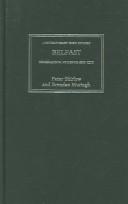| Listing 1 - 4 of 4 |
Sort by
|
Book
ISBN: 1781703035 1847793436 9781847793430 9780719080111 0719080118 Year: 2010 Publisher: Manchester, UK New York New York Manchester University Press Distributed exclusively in the USA by Palgrave Macmillan
Abstract | Keywords | Export | Availability | Bookmark
 Loading...
Loading...Choose an application
- Reference Manager
- EndNote
- RefWorks (Direct export to RefWorks)
Drawing on over 150 interviews with former IRA, INLA, UVF and UFF prisoners, this is a major analysis of why Northern Ireland has seen a transition from war to peace. Most accounts of the peace process are 'top-down', relying upon the views of political elites. This book is 'bottom-up', analysing the voices of those who actually 'fought the war'. What made them fight, why did they stop and what are the lessons for other conflict zones?Based on a Leverhulme Trust project and written by an expert team, the book offers a new analysis, based on subtle interplays of military, political, economic an
Peace-building --- Ex-convicts --- Political prisoners --- Political activity --- Attitudes. --- Northern Ireland --- Politics and government --- Northern Ireland. --- armed groups. --- ceasefires. --- conflict. --- former prisoners. --- loyalists. --- peace process. --- peace. --- republicans. --- violence.

ISBN: 1849642060 9781849642064 0745324819 9780745324814 0745324800 9780745324807 Year: 2006 Publisher: London Ann Arbor Pluto
Abstract | Keywords | Export | Availability | Bookmark
 Loading...
Loading...Choose an application
- Reference Manager
- EndNote
- RefWorks (Direct export to RefWorks)
Examines segregation and its impact on social divisions and the peace process.
Segregation --- Violence --- Social conflict --- Belfast (Northern Ireland) --- Social conditions
Book
ISBN: 1849643407 1281878766 9786611878764 1435690753 9781849643405 6611878769 9781435690752 9780745326313 0745326315 9780745326320 0745326323 9781281878762 Year: 2008 Publisher: London Ann Arbor, MI Pluto Press
Abstract | Keywords | Export | Availability | Bookmark
 Loading...
Loading...Choose an application
- Reference Manager
- EndNote
- RefWorks (Direct export to RefWorks)
Ex-convicts --- Political prisoners --- Conflict management --- Political violence --- Political activity --- Northern Ireland --- Politics and government
Book
ISBN: 1526139278 9781526139276 152613926X 9781526139269 Year: 2021 Publisher: Manchester, UK : Manchester University Press,
Abstract | Keywords | Export | Availability | Bookmark
 Loading...
Loading...Choose an application
- Reference Manager
- EndNote
- RefWorks (Direct export to RefWorks)
Since the Good Friday Agreement, Northern Ireland seems changed almost beyond recognition. Violent incidents that were once commonplace are now rare and a younger generation has emerged with identities and interests more fluid and cosmopolitan than their parents. At the same time, however, the region remains in the long shadow of its recent turbulent history. The marginalisation of those who were victims, and indeed agents, of violence proves emblematic of a society still unable to deal with the traumas of the past. Northern Ireland a generation after Good Friday seeks to capture the complex and often contradictory realities of the region's peace process. Across nine original essays, the authors provide a critical and comprehensive reading of a society that seems to have left its violent past behind but at the same time remains subject to its gravitational pull. "The Good Friday Agreement is widely celebrated as a political success story, one that has brought peace to a region that was once synonymous around the globe with political violence. The truth, as ever, is rather more complicated than that. In many respects, the era of the peace process has seen Northern Irish society change almost beyond recognition. Those incidents of politically motivated violence that were once commonplace have become thankfully rare and a new generation has emerged whose identities and interests are rather more fluid and cosmopolitan than those of their parents. In many other regards, however, Northern Ireland continues to operate in the long shadow of its own turbulent recent past. Those who were victims of violence, as well as those who were its agents, have often been consigned to the margins of a society clearly still struggling to cope with the traumas of the Troubles. Furthermore, the transition to 'peace' has revealed the existence of new, and not so new, forms of violence in Northern Irish society, not least those directed towards women, ethnic minorities and the poor. Northern Ireland a generation after Good Friday sets out to capture the complex, and often contradictory, realities that have emerged more than two decades on from the region's vaunted peace deal. Across nine original essays, the authors offer a critical and comprehensive reading of a society that often appears to have left its violent past behind but at the same time remains subject to its gravitational pull." -- Back cover.
Government --- Politics. --- Great Britain. --- Influence. --- Northern Ireland --- Economic conditions. --- Economic conditions --- Politics --- Social conditions --- Brexit. --- cinema. --- consociationalism. --- constiutional change. --- ethno-nationalism. --- peace processes. --- political economy. --- prisoners. --- television. --- victims. --- women.
| Listing 1 - 4 of 4 |
Sort by
|

 Search
Search Feedback
Feedback About UniCat
About UniCat  Help
Help News
News